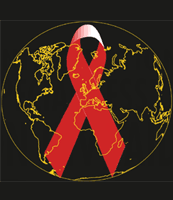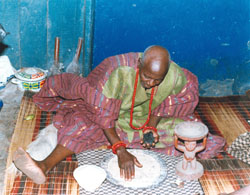This blog seeks to spotlight noteworthy UNESCO education and culture programs; it emphasizes links between the United States and UNESCO.
Friday, December 29, 2006
UNESCO Young Professionals Program
Young professionals (who will be under the age of 30 on May 1, 2008) should keep this program in mind, and consider applying next Fall when we expect the process will open again.
Wednesday, December 27, 2006
Reorganization of the Cultural Sector of UNESCO
Je procéderai dans les prochains jours à une restructuration du Secteur de la culture afin d’organiser ses quatre Divisions pour une mise en oeuvre efficace de l’ensemble des Conventions, qui devront désormais être gérées de manière cohérente et complémentaire. C’est l’un des grands défis que devra relever ma nouvelle Sous-Directrice générale pour la culture, Françoise Rivière, présente à mes côtés, ainsi que les quatre Directeurs qui l’accompagneront dans cette tâche.
I will proceed within the next days to a restructuring of the Culture Sector in order to put its four Divisions in a position to effectively implement the group of (UNESCO Cultural) Conventions, which ought to be managed in a coherent and complementary manner. This is one of the grand challenges which should relieve my new Sub-Director General for Culture, Françoise Rivière, here beside me, and the four Diectors who accompany him in that task.
Saturday, December 23, 2006
UN Educational, Scientific, and Cultural Organization (UNESCO)
The UN Educational, Scientific, and Cultural Organization (UNESCO) was established in 1945 with the primary objective of contributing to peace and security worldwide by promoting global collaboration through education, science, and culture. Since rejoining UNESCO on October 1, 2003, the United States continues to promote U.S. priorities at UNESCO in each of the Organization’s five sectors: Education, Culture, Communication and Information, Natural Sciences, and Social and Human Sciences. By promoting collaboration among nations, UNESCO strives to further universal respect for justice, the rule of law, human rights, and fundamental freedoms. Priority programs foster and defend the free flow of ideas and open access to education for all; build understanding of democratic principles and practice; promote scientific knowledge; and protect the cultural and natural heritage of humankind. UNESCO, which is headquartered in Paris, has 191 member states and has been led since 1999 by Director-General Koichiro Matsuura (Japan). He was reappointed for a four-year term in October 2005.
The Executive Board, one of UNESCO’s three constitutional bodies, consists of 58 member states with four-year terms of office. It examines the program of work and corresponding budget proposals, and ensures the effective and rational execution of the program by the Director-General. As a member of the Board, with a term that expires in 2008, the United States participated in the semiannual Board Sessions in Paris in April and September 2005. The Board continued negotiations on two instruments, the Convention on the Protection and Promotion of the Diversity of Cultural Expressions and the Declaration on Bioethics and Human Rights. The United States engaged actively in negotiating both of these instruments. In September, the Executive Board recommended that the General Conference, which met in October, consider the Convention on the Protection and Promotion of the Diversity of Cultural Expressions and the Declaration on Bioethics and Human Rights.
The Executive Board examined the Director-General’s preliminary proposals concerning UNESCO’s Program and Budget for 2008–2009. The Board also recommended that the Director-General temporarily stop creating normative instruments, put more effort into implementing education for all, and implement a review of the Natural and Social and Human Science programs.
U.S. priorities at the Executive Board were to maintain budget discipline within UNESCO and focus UNESCO program efforts and budget resources on the areas of literacy, capacity building in science and engineering, and the preservation of cultural objects. In particular, the United States was pleased with UNESCO efforts in the area of education.
In 2005, UNESCO saw several successes in the area of education, a main priority for the United States. The United States worked with other member states to promote results-based education programs at the country level, where they will do the most good toward achieving the goals of education for all. The United States also worked closely with UNESCO in launching the Literacy Initiative for Empowerment, a literacy strategic framework with the goal of achieving concrete, measurable results in 34 countries with the highest rates of illiteracy. U.S. literacy experts were included in the preparation of this strategy, as a way to help ensure that U.S. research and experience in this critical area could be shared with others, including the promotion of an inter-generational, mother/child approach to literacy programming.
At the General Conference in October, the United States was able to join consensus on the Declaration on Bioethics and Human Rights by heading off an intense effort to include a number of subjects that were inappropriate for the declaration. The United States, however, voted against the Convention on the Protection and Promotion of the Diversity of Cultural Expressions after it became clear that the Convention was going to be used to implement trade protections for “cultural expressions.” Negotiations on the Convention, which was heavily promoted by France and Canada, were set in motion by the adoption of a related Declaration before the U.S. reentry to UNESCO in 2003. In addition to concerns about the Convention’s potential effect on trade, the United States also expressed concerns about the impact of the Convention on the free flow of information. The vote on adoption of the Convention was 148 to two (U.S. and Israel), with four abstentions. Thirty countries must deposit their instruments of ratification with UNESCO for it to enter into force.
The UNESCO regular budget for 2005 was approximately $305 million; the U.S. assessment was $76.7 million. Since 1986, the United States has also regularly made voluntary contributions to UNESCO. The 2005 contribution totaled $837,000 and was used to support UNESCO-related international educational, scientific, cultural, and communications activities considered to be in the U.S. national interest. In 2005, of the 732 positions subject to geographic distribution, Americans held 30 posts, or 4.1 percent.
"UNESCO and its rivals: Protecting precious places"
Kaiping in southern China (with environs dotted with amazing fortified mansions built in the early 20th century), the Sydney Opera House, the French city of Bordeaux and the Greek island of Corfu have been proposed for recognition as “world heritage sites” by UNESCO.
Almost any location—a building, an entire city or a slice of nature can be considered for this status, which implies world acknowledgment that it is important to humanity and worth looking after. For host governments and locals, recognition brings prestige, tourism and technical aid.While 80 people work at UNESCO's World Heritage Center, its annual budget is only $9m. In practice, the Paris Center receives another $20m-25m per year in what it calls extra-budgetary funds, to which the biggest private donor is the United Nations Foundation, set up by Ted Turner, an American tycoon.
But there are already 830 such sites, and the currency will be debased if the number rises too fast. In theory, any government in the world can make up to two nominations—one a man-made site, the other a natural one—per year. In practice, new recognitions per year are held at an average of 20 to 25.
Then there are some private agencies that try to do the same job as UNESCO on a smaller scale. One is the New York-based World Monuments Fund, which shames the planet's vandals by listing sites threatened by neglect or conflict. (UNESCO also publishes lists of endangered sites, but denouncing bad behaviour by states will always be easier for a private body than for an inter-governmental agency.) Another aspiring mini-UNESCO is the California-based Global Heritage Fund, which has worked at historic sites to devise plans that allow for economic development as well as conservation. Without such a plan, a UNESCO listing risks leading to an unmanageable influx of tourists.
Francesco Bandarin, an Italian who runs the World Heritage Centre, says it is not jealous: it would like lots of imitators. Whatever 2007 brings for Corfu or China, it might be better still if more rich philanthropists took up the UN's challenge and gave it some competition.
Tuesday, December 19, 2006
The Protection and Promotion of Musical Diversity
The study addresses issues including:
* The relationship between the situation of musical diversity and the situation of human rightsRead the report (pdf) and the appendices (pdf)
* Musical diversity and sustainable development, covering aspects of the use of music in broader development, the use of music to alleviate poverty, and the development of a music industry
* Musical diversity and its potential contribution to peace
* Government standards and regulations that impact positively or negatively on musical diversity
* Musical diversity and the imposition of a monoculture, including commentary on the potential use and misuse of the new UNESCO Convention for the Protection and Promotion of the Diversity of Cultural Expressions
* Musical diversity and issues around personal and community identity
* Challenges and responses to musical diversity: an extensive exploration of various circumstances in which musical diversity is endangered and actions that might be taken in its support.
The International Music Council (IMC) is a global network of expert organizations and individuals working in the field of music. Founded in 1949 by UNESCO, IMC is mandated to promote musical diversity.
U. S. Support for Multinational Organizations
The United States is a leader in international development cooperation because of the large size of its economy, its ability to influence global action and its presence within the international donor community. It is the largest donor in the Development Assistance Committee (DAC) with a record high net official development assistance (ODA) of USD 27.6 billion in 2005.
As a share of Gross National Income, this ODA represented 0.22%. While this was its highest level since 1986, the US ranks second to last within the DAC for this statistic. The bulk of this growth is explained by Iraq debt forgiveness and reconstruction; reconstruction and anti narcotics efforts in Afghanistan; and specific programs in Africa, primarily Sudan and Ethiopia. Given the substantial debt relief granted for 2004-05, aid volumes may be lower in the future, although an annual level over USD 20 billion is probable.U.S foreign assistance funding is fragmented among government institutions. USAID was responsible for 38.8% of total ODA in 2005 (down from 50.2% in 2002). A primary factor in this decline was the rapid increase in ODA disbursements managed by the Department of Defense (21.7% in 2005 versus 5.6% in 2002).
While the volume of (U.S. support for) multilateral ODA has fluctuated over time, its share of gross ODA has experienced a decline from almost 26% in 2002 to 8% in 2005. This figure is among the lowest of DAC member nations. Thus not only does the United States provide less official development assistance as a portion of GDP than virtually any other developed nation, it provides a smaller portion of that assistance via multilateral organizations such as UNESCO.
Monday, December 18, 2006
UNESCO source book for science teaching, 2006
That in turn was followed by “The New UNESCO Sourcebook for Science Teaching,” printed in 1973 and reprinted until 1979, One can still find copies of the New Sourcebook for sale used on the Internet. The New Sourcebook was written by a team of American science educators. According to John Elfick, these books "revolutionized secondary school science teaching because they brought concepts normally left until tertiary education to secondary schools through simple experiments."
Elfick worked in UNESCO from 1990 to 1999, both in the Science Education section in Paris and in UNESCO Beijing. He describes himself has having become "obsessed with the idea of revising the UNESCO Sourcebook" and did so in Beijing in the Chinese language, assisted by the science staff at Capital Normal University. When he returned to the School of Education, University of Queensland, Australia, he started putting the English version on the internet. Click here to see that version.
It has since received almost 150,000 hits, over 40% from North America. Now UNESCO has given John Elfick a contact to produce the book version, and you can see his progress on the website.
Thanks to Bob Maybury for alerting us to the history of this important effort.
UNESCO: 50 Years for Education
Thinkers on Education
 In 1993 and 1994, PROSPECTS: Quarterly review of comparative education published a series of profiles of 100 famous educators (including philosophers, statesmen, politicians, journalists, psychologists, poets, men of religion) from around of the world.
In 1993 and 1994, PROSPECTS: Quarterly review of comparative education published a series of profiles of 100 famous educators (including philosophers, statesmen, politicians, journalists, psychologists, poets, men of religion) from around of the world.The International Bureau for Education (IBE) offers access to these profiles, together with the profiles which have been published in subsequent issues of PROSPECTS (The UNESCO quarterly review of comparative education) online. They are available in English, French and Spanish.
Click here to go to the website and read the profiles.
Paper copies of Thinkers on Education in four volumes (sold together) are available for 30,50 € from: UNESCO Publishing.
Technologies for Education: Potential, Parameters, and Prospects
 This book is by Wadi Haddad, a member of the Advisory Council of Americans for UNESCO, and a former member of its Board of Directors, and Alexandra Draxler of UNESCO. It "explores how information communications technologies can promote improvements in educational reach and delivery, content, learning outcomes, teaching, quality, and pertinence in developing countries." (PDF, 1.5 MB)
This book is by Wadi Haddad, a member of the Advisory Council of Americans for UNESCO, and a former member of its Board of Directors, and Alexandra Draxler of UNESCO. It "explores how information communications technologies can promote improvements in educational reach and delivery, content, learning outcomes, teaching, quality, and pertinence in developing countries." (PDF, 1.5 MB)
The United States Mission to UNESCO
http://www.unesco.usmission.gov/
Saturday, December 16, 2006
Environmental Ethics and International Policy

What is the moral value of the environment? What in nature is worth protecting, preserving or respecting? What do we mean by global sustainability? How much should we care for the interests of future generations? What are the implications of the principle of justice for policy decisions related to environmental issues?In this new publication from UNESCO, eight experts in environmental ethics from around the world, advising the World Commission on the Ethics of Scientific Knowledge and Technology, address key ethical issues at stake in environmental sciences and policies. The studies presented analyze the state of the art in the relatively new area of environmental ethics. They also develop approaches to determining how international policy can promote ethical reflection about the environment.
The book is available from UNESCO publications for 22,00 €.
Friday, December 15, 2006
The UNESCO Digital Arts Award
 Young artists around the world are encouraged to submit creative projects based on the DigiArts’ 2007 theme ‘Urban Environment and Communities’.
Young artists around the world are encouraged to submit creative projects based on the DigiArts’ 2007 theme ‘Urban Environment and Communities’. The prize of US$10.000 will be awarded to one or several laureates. In addition, the prize winner(s) will be invited to lead a training workshop at the Sharjah Biennial 8 (4 April - 4 June 2007, Sharjah, United Arab Emirates): "Still life - Art Ecology and the Politics of Change".
Deadline for submission: 31 December 2006
Click here to transfer to UNESCO's Call for submissions.DigiArts is one of UNESCO’s major initiatives aiming at the development of interdisciplinary activities in research, creativity and communication in the field of media arts.
AIMS of the project:
# Disseminate historical, theoretical, artistic, technical and scientific research in the field of electronic and digital arts, including interdisciplinarity study of the arts and the sciences;The UNESCO Digital Arts Award forms a special category of the UNESCO Prize for the Promotion of the Arts and is dedicated to recognizing outstanding creative achievements by young artists using innovative expressions and forms through the use of digital technology.
# Promote information exchange, dialogue and communication among artists, scientists and technicians from different geo-cultural regions, especially enabling developing countries to develop their own approaches and practices in various disciplines and fields of knowledge connected to media arts;
# Support existing institutions and networks throughout the world in the transfer of knowledge;
# Encourage the use of electronic software among the youth for electronic communication and creation.
Monday, December 11, 2006
Kofi Annan at the Truman Library
 You Americans did so much, in the last century, to build an effective multilateral system, with the United Nations at its heart. Do you need it less today, and does it need you less, than 60 years ago?
You Americans did so much, in the last century, to build an effective multilateral system, with the United Nations at its heart. Do you need it less today, and does it need you less, than 60 years ago?Surely not. More than ever today Americans, like the rest of humanity, need a functioning global system through which the world's peoples can face global challenges together. And in order to function, the system still cries out for far-sighted American leadership, in the Truman tradition.
Wednesday, December 06, 2006
Join the EFA Global Monitoring Report Online Consultation
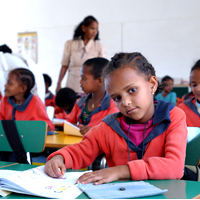 From 4 to 22 December an online consultation will review what governments are doing to reach the unreached, as a contribution to the 2008 EFA Global Monitoring Report.
From 4 to 22 December an online consultation will review what governments are doing to reach the unreached, as a contribution to the 2008 EFA Global Monitoring Report.The purpose of the online discussion is to review what governments, in partnership with the international community and civil society, are doing to reach the un-reached children, youth and adults with good quality education. The consultation includes both formal and non-formal education. Gender analysis is central to the discussion. Discussion is invited in relation to:
• Successful policies and programs
• Key challenges to tackle exclusion
• Role of the international community
• Flexibility and innovation in provision
• Teacher recruitment, retention and professionalism
We look forward to contributions which highlight successful policies and programs and examine key challenges that countries face. The consultation will provide useful material for the 2008 EFA Global Monitoring Report.
Register here
Join the discussion here
Three Questions to Nicholas Burnett, Director of the EFA Global Report Monitoring Team
Friday, December 01, 2006
World AIDS Day 2006: Message from Director-General of UNESCO
This year marks 25 years since the world first heard the acronym ‘AIDS’. Since 1981, we have witnessed major achievements in the response to the epidemic - from individuals and local communities up to the global level.
This year, World AIDS Day is dedicated to the theme of ‘accountability’. It is a theme that embraces responsibility for one’s personal conduct, solidarity between individuals and groups in different countries, and pledges made by major global organizations and national governments. In many cases, accountability boils down to whether commitments are being honored and promises being kept. In this regard, there are encouraging indications that the world is willing to address the ongoing challenge posed by the epidemic.
Governments worldwide committed themselves to accelerating their responses to the epidemic at the 2001 United Nations General Assembly Special Session on HIV/AIDS (UNGASS), a commitment that was reaffirmed at the United Nations World Summit in 2005 and again at this year’s High-Level Meeting on AIDS. In the years following UNGASS, there has been strengthened action at all levels, with increased leadership and commitment, more resources and intensified delivery of HIV prevention, treatment, care and support.
Despite this progress, however, approximately 40 million people are living with HIV today, an estimated 8,500 new infections occur daily and only one in ten people have access to treatment and prevention services, including prevention of mother-to-child transmission and access to antiretroviral therapy. There can be no room for complacency when it comes to HIV and AIDS. Strong action is required, particularly through massively expanded and intensified prevention efforts alongside activities to expand access to treatment, care and support. Otherwise, the epidemic will continue to spread and threaten hard-won development gains and future prospects for sustainable development.
For its part, UNESCO undertakes its work in the context of a broader effort organized through UNAIDS to move towards Universal Access to prevention, care, treatment and support. The priority that UNESCO has given to education is based on evidence that education contributes towards the knowledge and personal skills essential for the prevention of HIV, and protects individuals, families, communities and nations from the impact of AIDS. Beyond this, education can create the conditions of understanding and tolerance that contribute to reduced stigma and discrimination against people living with HIV.
To reflect the priorities of Universal Access and UNESCO’s role within the UNAIDS program, earlier this year I initiated a revision and updating of the UNESCO strategy on HIV and AIDS. This is being conducted through an extensive consultative process throughout UNESCO and, when completed at the end of this year, will provide the framework for guiding our actions in the years ahead. The overarching goal of the strategy remains to ensure that Member States have the most effective response to HIV and AIDS in all sectors relevant to UNESCO’s mandate. The priority is to prevent the spread of HIV through education and to protect the core functions of the education system from the worst effects of the epidemic, drawing on the strengths and resources of all UNESCO sectors.
In 2004, UNESCO raised its level of engagement by establishing its leading role in EDUCAIDS, the Global Initiative on Education and HIV & AIDS, supporting comprehensive education sector responses.
In these and other ways, UNESCO is addressing the challenges presented by the HIV and AIDS epidemic. I urge everyone to use the occasion of this year’s World AIDS Day to renew our collective commitment by holding ourselves accountable for the success of UNESCO’s response to HIV and AIDS.
Some of the events that UNESCO is organizing throughout the world include:
Kenya: Conference on HIV-positive teachers in Eastern and Southern Africa
Morocco: Web portal discussion on HIV and AIDS
Thailand: Guinness World Records attempt to create the World’s Longest Condom Chain
Russian Federation: Contemporary Arts Project
Russian Federation: Launch of “HIV/AIDS and Human Rights: Young People in Action” Kit
Uganda: Launch of Toolkit for Youth in Africa on Theatre, HIV and AIDS
UNESCO and US Library of Congress Host Meeting on World Digital Library Project
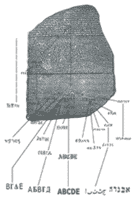
 UNESCO and the Library of Congress will host today at UNESCO Paris Headquarters a meeting to pave the way for the launch of a World Digital Library, an internet-based repository of knowledge from all cultures and in all languages.
UNESCO and the Library of Congress will host today at UNESCO Paris Headquarters a meeting to pave the way for the launch of a World Digital Library, an internet-based repository of knowledge from all cultures and in all languages. The meeting will seek to establish a network of experts and partners who will work on the project. It is hosted by UNESCO Assistant Director-General for Communication and Information Abdul Waheed Khan, U.S. Ambassador to UNESCO Louise Oliver, and Librarian of Congress James H. Billington, who first proposed the idea for a World Digital Library in 2005. It will be chaired by Claudia Lux, President-elect of the International Federation of Library Associations and Institutions (IFLA).
“Making all this available free of charge on the Internet will give teachers and librarians a new resource to encourage young people to reads and study foreign languages, and will advance learning both with and between countries”, said Laura Bush, First Lady of the United States of America, and Honorary Ambassador for the UN Literacy Decade, in a message to the meeting.
“I am pleased UNESCO, the United States and other partners continue moving forward on this important initiative,” said UNESCO Director-General Koïchiro Matsuura. “We must encourage all Member States to pool efforts at all levels to protect unique and endangered books, manuscripts, archival documents and audio-visual materials through the use of state-of-the art technologies,” added Mr Matsuura.A key aspect of the project is to build digital library capabilities in the developing world, so that all countries and parts of the world can participate and be represented in the World Digital Library.
“For UNESCO, libraries – be they paper-based or digital – have always played a crucial role to fulfill its mandate to promote the free flow of ideas by word and image and to maintain, increase and spread knowledge”, said Abdul Waheed Khan announcing UNESCO’s support to the initiative.Related links
*Proposal for a World Digital Library. James H. Billington. The Librarian of Congress. Remarks to the Plenary Session. The U.S. National Commission for UNESCO. Georgetown University. 6 June 2005
* U.S. Mission to UNESCO
* UNESCO Supports Libraries
* World Digital Library Initiative Factsheet
* Should UNESCO Promote the Development of a World Digital Library?
* World Digital Library Planned: Library of Congress Envisions Collection to Bridge Cultures
Sunday, November 26, 2006
UNESCO Co-Organizes "Water for Life" Concert in the Sahara
 “Water for Life” is the theme UNESCO Goodwill Ambassador Jean Michel Jarre has chosen for an exceptional concert among the sand dunes of the Moroccan Sahara on 16 December. The Modern Arab Orchestra of Casablanca, the Morocco Philharmonic Orchestra and a number of eminent soloists will join Jean Michel Jarre on-stage for this unique concert which will take place at Merzouga, Morocco.
“Water for Life” is the theme UNESCO Goodwill Ambassador Jean Michel Jarre has chosen for an exceptional concert among the sand dunes of the Moroccan Sahara on 16 December. The Modern Arab Orchestra of Casablanca, the Morocco Philharmonic Orchestra and a number of eminent soloists will join Jean Michel Jarre on-stage for this unique concert which will take place at Merzouga, Morocco. The concert is organized with the support of the Kingdom of Morocco and UNESCO. The concert will also be one of the highlights marking the end of the United Nations International Year of Deserts and Desertification and part of the UN Water for Life Decade (2005-2015). Using his hallmark state-of-the-art visual and sound technology, the French composer/musician will stress the importance of protecting and properly managing the planet’s limited freshwater resources and halting the advance of desertification.
“We want this concert to be a wake up call. We want to make people more aware of just how precious water is and the critical need to look after what we have,” said Jarre.
*Check out the UNESCO Water Portal to learn about Water Events Worldwide and more
*Our previous postings:
A World of Science
U.S. to host 2007 UNESCO Hydrology Meeting
*World Water Assessment Program
* Facts and Figure extracted from the 2006 UN World Water Development Report
Senegal Hosts Event to Launch the 2007 EFA Global Monitoring Report on Early Childhood
 Photo ©UNESCO/Sam Dhillon
Photo ©UNESCO/Sam DhillonFrom 27-30 November some 80 experts, including African ministers, delegates of UNESCO, UNICEF, and the World Bank will meet at the UNESCO Regional Office in Dakar (BREDA) to discuss the 2007 Report and strategies for developing early childhood care and education (ECCE) in Africa. We are proud to announce that Americans for UNESCO Board Member Emily Vargas-Barón will be a keynote speaker at the event. She will invite nations to consider and debate their options in view of the appalling statistics and few resources for children in the region.
ECCE is considered a missing link in the education chain in many regions of the world. More than half the countries in sub-Saharan Africa do not have a formal program for children under age three and participation in pre-primary education is less than 10%, according to the Report published by UNESCO. Most countries unlikely to reach the EFA goal are located in sub-Saharan Africa, the Arab States and South Asia. Financing, links between education and poverty reduction, the development of national early childhood policies and international partnerships are among the themes on the agenda.
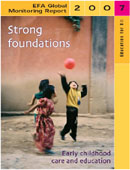
The EFA Global Monitoring Report is an annual publication prepared by an independent team based at UNESCO. It monitors progress towards the six Education for All goals adopted in Dakar, Senegal in 2000:
1) expand and improve early childhood care and education
2) provide free and compulsory universal primary education by 2015
3) equitable access to learning and life-skills programs
4) achieve a 50% improvement in adult literacy rates
5) eliminate gender disparities in primary and secondary education by 2005 and at all levels by 2015
6) improve all aspects of the quality of education
The last day of the meeting will highlight UNESCO’s Plan of Action for accelerating EFA Goal 1 in Africa and regional frameworks, with a concluding plenary on “next steps”. Click here for a detailed agenda of the meeting.
Journalists are invited to participate in the regional launch of the EFA Global Monitoring Report at 9:30 am at the Sofitel-Teranga. The report will not be presented at the press question and answer at 12:45 pm.
Wednesday, November 22, 2006
UNESCO Hosts Roundtable to Discuss Violence Against Girls in School
 International experts will meet at UNESCO Headquarters on 23 November to examine the problem of violence against girls in school and how it should be dealt with. The roundtable, will be opened by Director-General Koïchiro Matsuura and Michel Doucin, Ambassador for Human Rights, French Foreign Affairs Ministry. The meeting will be divided into three panels that will focus on:
International experts will meet at UNESCO Headquarters on 23 November to examine the problem of violence against girls in school and how it should be dealt with. The roundtable, will be opened by Director-General Koïchiro Matsuura and Michel Doucin, Ambassador for Human Rights, French Foreign Affairs Ministry. The meeting will be divided into three panels that will focus on: - The role and responsibility of national and local public authorities,
- The role and responsibility of civil society and NGOs
- The role and responsibility of educational personnel
Recent reports, including Mr. Pinheiro’s study, The Secretary-General’s in-depth Study on Violence against Women, and the Education for All Global Monitoring Report published by UNESCO, show that gender-based violence in schools, often in the form of sexual violence and harassment, persists in all countries. It represents a generalized violation of human rights and a major obstacle to the achievement of Education for All: of the some 77 million children not enrolled in school, some 55 percent are girls.
The roundtable is organized by UNESCO, the French National Commission for UNESCO and the French Ministry of Foreign Affairs.
First Intergovernmental Committee for the Safeguarding of the Intangible Cultural Heritage Meeting
In charge of implementing UNESCO’s International Convention for the Safeguarding of the Intangible Cultural Heritage, the Committee’s first task is to prepare operational directives for the Convention, with particular attention to assistance mechanisms and criteria for inscription.
Among the masterpieces of the oral and intangible cultural heritage of humanity proclaimed by UNESCO in 2001, 2003 and 2005, are manifestations such as the Oruro Carnival (Bolivia), the Ningyo Johruri Bunraku puppet theatre (Japan) and the Ahellil of Gourara, a poetic and musical genre emblematic of southwest Algeria.
In March 2004, Algeria became the first State to deposit its instrument of ratification of the Convention. As of 13 November 2006, 68 States ratified the Convention.
UNESCO Program of the Intangible Heritage
The 24 members of the Intergovernmental Committee
Tuesday, November 21, 2006
More International Students Earn Doctorates in the U.S.
International students represent an important means for strengthening U.S. cultural diplomacy around the world. New reports show that the United States continues to welcome more international students than any other country and that a growing percentage of the doctorates U.S. universities award are earned by students who are not residents of the United States.
According to a new report by the National Science Foundation (NSF), "U.S. Doctorates in the 20th Century", the largest groups of international students earning doctorates have come from China, India, Taiwan and South Korea. Students from the People's Republic of China, the largest international group, received more than 24,000 of the doctorates awarded by U.S. universities in the 1990s.
The NSF report describes the development of the unique U.S. graduate education in which fundamental research is conducted at universities, typically with the assistance of graduate students. The report also discusses other important changes in graduate education. Women made up 47 percent of all U.S.-citizen Ph.D.s from 1995 to 1999 -- a more than fourfold increase from 1960 to 1964, when they earned just 11 percent of U.S. doctorates. Minorities now earn about 14 percent of U.S. doctorates in both the sciences and engineering and in other fields as well.
International student enrollment declined slightly in the aftermath of the terrorist attacks on September 11, 2001, after more than 30 years of continuous growth. The ACE report attributes this decline to a variety of factors including "perceptions that it is difficult to secure visas and that the United States is unwelcoming to international students; competition from other countries; the high cost of U.S. higher education; increasing higher education capacity in countries that traditionally send a large number of students to study overseas, such as China and India; and increased anti-American sentiment around the world."
For more information, see the Department of State's e-Journal Study in the U.S.
© Jeffrey Thomas/ U.S. DoS
UNESCO and HP Launch Project To Counter Brain Drain In Africa

The UNESCO Hewlett-Packard “Piloting Solutions for Reversing Brain Drain into Brain Gain for Africa” project was launched yesterday to help reduce brain drain in Africa by providing universities laboratories and research centers in Algeria, Ghana, Nigeria, Senegal and Zimbabwe with systems of interconnections that will enable students and faculty who have stayed in their countries to establish links with researchers and professionals around the world.
The African project was developed by UNESCO’s Education Sector in response to requests by Member States. Over the past decades, African countries have suffered greatly from the emigration of skilled professionals, scientists, academics and researchers who are estimated to be leaving the continent at the rate of 20,000 a year.
The Education Ministries of the countries involved, along with UNESCO, will choose the universities that will benefit from the project. Preference will be given to university departments with important information technology components. HP will provide equipment and local human resources to the universities, as well as training and support, until the projects become self-sustainable. It will also donate PCs and monitors and fund research visits abroad and meetings between beneficiary universities. UNESCO will be in charge of overall coordination and monitoring of activities, as well as administrative management; evaluation and promotion of results.
This new project in Africa follows the successful joint HP-UNESCO “Piloting Solutions for Alleviating Brain Drain in South East Europe” project, launched in 2003. Three years after its launch, the project has resulted in the development of websites, databases and new research projects at several of the universities involved. Four universities* have become self-sustainable in the use of grid technology and the project continues in three other universities**.
*University of Split in Croatia, University of Montenegro, East Sarajevo University and the University of Sarajevo
Related
Check out the October 2006 issue of UNESCO’s “Education Today” Newsletter: From brain drain to brain gain (PDF)
African students the most mobile in the world, From the UNESCO Institute for Statistics
Hewlett-Packard and UNESCO, A partnership that works
Sunday, November 19, 2006
Join the UNESCO/OECD Internet Discussion Forum on Open Educational Resources
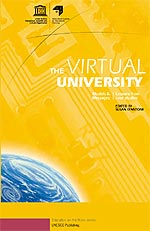 UNESCO’s International Institute for Educational Planning (IIEP) and the OECD’s Centre for Educational Research and Innovation (CERI) are holding an Internet discussion forum to focus on the findings and conclusions from a draft OECD study on Open Educational Resources*, and raise awareness on OER. The Community of Interest that has been formed has been active since October 2005 and has more than 600 members from 94 countries. For more information about the Community and previous discussions, go to http://www.unesco.org/iiep/virtualuniversity/forums.php.
UNESCO’s International Institute for Educational Planning (IIEP) and the OECD’s Centre for Educational Research and Innovation (CERI) are holding an Internet discussion forum to focus on the findings and conclusions from a draft OECD study on Open Educational Resources*, and raise awareness on OER. The Community of Interest that has been formed has been active since October 2005 and has more than 600 members from 94 countries. For more information about the Community and previous discussions, go to http://www.unesco.org/iiep/virtualuniversity/forums.php. The forum will end on December 1st,2006. The upcoming sessions are organized as follows:
- 20-26 November: What are the motives or incentives and barriers for individuals and institutions to use, produce and share OER?
- 27 November – 1 December: What are the policy implications and the most pressing policy issues at institutional, regional and national level coming out from this study?
To participate in the forum, send an email to Susan D’Antoni with "Join OECD OER forum" in the subject line.
For more information and continuous updates regarding the OECD study, go to http://www.oecd.org/edu/oer.
*OER – educational resources that are freely available on the Internet for use, adaptation and re-use
Saturday, November 18, 2006
The Global Microscience Project (GPME)
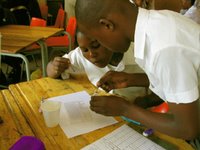
Practical experiences are an essential part of learning science. However, in many countries these experiences are not provided in the majority of their primary and secondary schools. There are several reasons for this: cost, safety, waste disposal and teacher preparation. Indeed, relatively few university students can be trained in science because of these factors. To help overcome these problems, microchemistry and other microscience kits and workbooks have been developed under this UNESCO project.
The project has been in existence for several years, and more than 80 countries have introduced microchemistry workshops and training courses. In some countries, UNESCO-Associated Centers have been established to further develop the microscience project. Now, English versions of the available microscience materials provide coverage of all educational levels: from primary to all of the secondary level (and university/tertiary level in some cases). While the set of teaching and learning packages is only complete in English, many specific microscience materials are available in other languages.
Download Microscience Materials (English Version): Click on the materials to download the different chapters.
I. Primary Microscience Experiences
II. Chemistry
III. Physics (Microelectricity)
IV. Biology
Friday, November 17, 2006
UNESCO's Decentralization Policy

UNESCO's Decentralization Action Plan groups Member States for service by a global network of multi-disciplinary Cluster Offices, National Offices, Regional Bureaus and Liaison Offices. The Bureau of Field Coordination is responsible for ensuring the smooth implementation of this new field network and provides a clear, single line of management. In addition, UNESCO Institutes and centers with well defined mandates and operations exist worldwide.
Click on the subtitle below for linked lists of the relevant offices.
Cluster Offices
These are the main platform for delivery of all UNESCO activities. They are multidisciplinary, ideally with each Sector represented. The Head of Office, while often having a background in a particular field, mostly play executive roles, managing the Program Specialists covering the various domains. The office implements a cluster program which is the result of consultation and consensus; National Offices join that cluster program.
National Offices
National Office programs are more focused, according to their individual purposes. They implement a time-bound national program, which results from consultations within that country. They assist in devising the cluster program where that Member State is concerned.
Regional Bureaus
Each Regional Bureau is responsible for the program in a given region and program domain; the programs are implemented through the Cluster and National Offices and drawn up through regional consultations. Regional Bureaus are almost always located in a Cluster Office and as such benefit from staff in a variety of fields, but often have an additional complement in their own substantive domain. Those staff with regional responsibilities based in offices other than Regional Bureaus act first and foremost as Program Specialists answerable to the Head of their Office. Regional Bureaus have no representational authority, nor do they oversee the Cluster and National Offices in hierarchical terms.
Liaison Offices
Liaison offices in New York and Geneva maintain close relationship with the Headquarters of the United Nations and other United Nations organizations.
Websites of UNESCO Institutes and Centers
There are two UNESCO international Centers and nine Institutes. They are all linked to this website.
Thursday, November 16, 2006
Winners of the 2006 UNESCO Literacy Awards
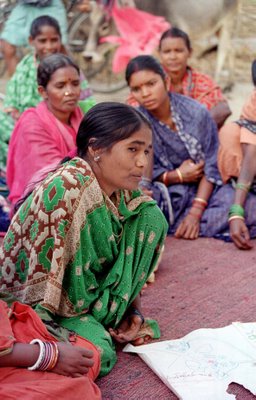 © UNESCO/B. O'Malley
© UNESCO/B. O'MalleyThe UNESCO prizes are awarded annually in recognition of particularly effective contributions to the fight against illiteracy, one of UNESCO’s priorities. This year’s Prizes have been attributed to the following literacy projects:
The UNESCO International Reading Association Literacy Prize* has been awarded to the National Commission for Human Development (NCHD) of Pakistan, which provides literacy classes to adults and to out-of-school children, recruits volunteers and schoolteachers to ensure wide community participation in the enrolment of children in school. >> More
The Mother Child Education Foundation (Turkey) has received one of the two UNESCO King Sejong Literacy Prizes** for its contribution to literacy, and to raising women’s political awareness and participation in decision-making processes. The other UNESCO King Sejong Literacy Prize was given to the Youth and Adult Literacy and Education Chair of the Latin American and Caribbean Pedagogical Institute of the Republic of Cuba (IPLAC). Its program – Yo, sí puedo – has been adapted to, and replicated in different parts of the world.
As for the two UNESCO Confucius Prizes for Literacy***, awarded for the first time this year, one prize was presented to the Ministry of National Education of the Kingdom of Morocco for its Non-formal Education Programme designed specifically for marginalized adolescents in rural areas. The other UNESCO Confucius Prizes for Literacy is awarded to the Directorate of Literacy and Continuing Education of Rajastan, India for having raised literacy significantly among both men and women during the past decade through innovative programs – including educational camps covering subjects such as vaccination, sanitation, child care, family planning, environmental issues, etc.
**The two US $ 20,000 King Sejong Literacy Prizes were created in 1989 through the generosity of the government of the Republic of Korea.
***The US $ 20,000 UNESCO Confucius Prize for Literacy was established 2005 through the generosity of the Government of the People’s Republic of China.
UNESCO Beijing Office: The Education Programs

The goal of Education for All (EFA) is at the core of UNESCO Beijing’s Regular Program in education, with emphasis on expanding opportunities for women, girls and ethnic minorities. A highlight of the education program by UNESCO Beijing is its cooperation with the International Research and Training Center for Rural Education (INRULED).
The Office continues to support the Golden Key Research Center of Education for the Visually Impaired. Golden Key is a Chinese non-governmental organisation dedicated to educating visually impaired children in rural areas.
UNESCO has been providing support to China, D.P.R. Korea and Mongolia under the transdisciplinary program on “Educating for a Sustainable Future (EPD)”, for their national efforts in integrating issues of environment, population, health, and development through education, training and information activities. UNESCO Beijing also contributes to the development of technical and vocational education in these three countries, thereby promoting a “learning society” in which education is no longer restricted to its traditional forms.
The UNESCO Beijing Office regularly cooperates with UNDP, UNICEF and other UN agencies on a number of projects and inter-agency activities. With UNDP China, UNESCO Beijing has been working as a technical cooperative agency for the project “Capacity Building for Environmental Education in Primary and Middle Schools through the Production of Interactive Teaching Materials.” It is also implementing the project “Improving Nine-year Compulsory Education in Poor Areas, Focussing on Girl Students”.
UNESCO's Beijing Office

UNESCO's Beijing Office was created in 1984 as the UNESCO office in China for Science and Technology. The office has gradually expanded its activities and territory since then. In January 2002, it became a Cluster office for East Asia covering the Democratic People's Republic of Korea (DPRK), Japan, Mongolia, the People's Republic of China and the Republic of Korea (ROK). The office serves as the main platform to communicate with UNESCO's Member States in the region.
The Beijing Cluster covers 25% of the world population, consisting of five countries that are interrelated historically and culturally. There are, however, significant cultural and societal differences among the countries. The languages are totally different. Two are highly industrialized countries, two are less developed.
Today, the office serves all five UNESCO programs:
* EducationThe Social and Human Sciences sector unit was created in February 2002. The Communication and Information sector unit was created in September 2004.
* Natural Sciences
* Social and Human Sciences
* Culture
* Communications and Information
UNESCO and Sony Ericsson WTA Tour announce Global Partnership to Advance Gender Equality

UNESCO and the Sony Ericsson Women’s Tennis Association Tour (WTA) just announced a landmark global partnership. The social responsibility program marks a new level of commitment to raise awareness of gender equality issues and advance opportunities for women’s leadership in all spheres of society.
Venus Williams has volunteered to serve as the first global “Promoter of gender equality” under the partnership:
“I have always believed that as the world’s leading sport for women, we have a responsibility to do everything we can to help break down barriers to success for women. Through this partnership with UNESCO, our goal is to let women and girls throughout the world know that there are no glass ceilings, and to do our part to support programs that provide real opportunities for women to succeed in whatever they set their minds to.”
UNESCO Director-General Koïchiro Matsuura stated: “I am very happy to announce (…) that UNESCO and the Sony Ericsson WTA are joining forces to launch a unique program between the private sector and a UN agency aimed at strengthening national commitment to women’s empowerment and enhancing women’s capacity to fully partake in all forms of societal development…”
Key planned elements of the program include:
- A Sony Ericsson WTA Tour/UNESCO Fund for women and leadership. The fund will be endowed initially with approximately €200,000 as seed funding,
- A “Promoter of Gender Equality” player program, which will involve players at both a global and national level in awareness raising activities as well as direct involvement in specific gender equality and women’s leadership programs throughout the world,
- Mentoring, scholarship and fellowship programs designed create opportunities and the environment for women and girls to succeed in all walks of life and usage of existing UNESCO and Sony Ericsson WTA Tour tournaments, galas and conferences as awareness and fundraising platforms. Additionally, the Sony Ericsson Championships promoters and the city of Madrid will support the program through marketing, awareness and fundraising activities. Advertising to raise awareness of gender equality issues is also planned.
UNESCO promotes the empowerment of women, women’s rights and gender equality as an overall objective in its five fields of competence: education, natural and human sciences culture and communication/information. In particular, UNESCO seeks to integrate a gender equality perspective into all stages of its program. The ultimate goal is to strengthen the Organization’s ability to create the conditions for women and men alike, from all walks of life, to enjoy human development and peace on an equal basis.
Related
*United Nations Girl's Education Initiative (UNGEI)
*Toolkits on Education of Girls and Women
*EFA Global Monitoring Report 2003/2004 (Focus on Gender and Education for All
©Photo: AFP/USA Today
Towards a New UNESCO Portal on Higher Education Institutions
 Free of charge, easy to access and searchable, these are the characteristics of the Pilot Project “UNESCO Portal on Recognized Higher Education Institutions”. Experts met in UNESCO on 13 and 14 November to discuss the ways to increase the transparency of quality provision in cross-border higher education.
Free of charge, easy to access and searchable, these are the characteristics of the Pilot Project “UNESCO Portal on Recognized Higher Education Institutions”. Experts met in UNESCO on 13 and 14 November to discuss the ways to increase the transparency of quality provision in cross-border higher education.The principal aim of the Pilot Project is to provide information and easy access to online resources for students through a UNESCO-hosted portal. The pilot project will involve a limited number of countries that are each responsible for their own national content. Once the feasibility, cost-effectiveness and sustainability of the project are established, it can provide the foundations for the implementation of a larger-scale project hosted by UNESCO.
This project is a follow-up to the UNESCO/OECD Guidelines on Quality Provision in Cross-Border Higher Education.
Related links
*UNESCO’s work in Higher Education
*UNESCO Position Paper on Globalization
*UNESCO/OECD Guidelines on “Quality provision in cross-border higher education” (available in English, French, Spanish, Russian, Arabic, and Chinese)
Reflect and Celebrate on November 16, World Philosophy Day & International Day for Tolerance
Countries in all regions of the world will be organizing events in celebration of World Philosophy Day. >>Events in the World
>> Click here for a more detailed look at the World Philosophy Day program.
At UNESCO Headquarters in Paris, two international seminars and an exhibit will be held throughout the week until November 18. Topics for discussion are “A century with Levinas: Levinas-Blanchot, thinking the difference” and “Philosophy as a cultural and educational practice: a new citizenship”. Philippe Maurice’s paintings and a dramatic “Installation” by the Collectif fragmentaliste entitled “From the Fragment to the Series” will add a visual dimension to the seminars.
If you are in New York, you may want to attend the celebrations organized and hosted by St. John Fisher College, Pittsford, NY. Events are free and open to the public. Today’s sessions are scheduled through 9 p.m. Topics include “Philosophy and Education,” “Philosophy and Science Fiction,” “Philosophy in Popular Culture,” “Philosophy and Communication,” “Philosophy and the Creative Arts,” “Philosophy and the Emotions,” and “Philosophy in the 21st Century.”
In celebration of International Day for Tolerance, the 2006 UNESCO-Madanjeet Singh Prize for the Promotion of Tolerance and Non-Violence will be awarded at a ceremony to take place at 6 p.m at UNESCO Paris.
This Prize was established thanks to UNESCO Goodwill Ambassador, Madanjeet Singh, to mark the 125th anniversary of the birth of Mahatma Gandi. The Prize is presented every two years to individuals or institutions in recognition of exceptional achievements in the promotion of tolerance and non-violence.
The 2006 UNESCO-Madanjeet Singh Prize will be awarded to Veerasingham Anandasangaree from Sri Lanka, President of the Tamil United Liberation Front (TULF). A tireless defender of democracy and peaceful conflict resolution, Veerasingham Anandasangaree has helped improve knowledge of the Tamul cause, through dialogue, through the promotion of non-violent solutions in Sri Lanka and by taking a stand against terrorism.
- The Conference on "Interregional Philosophical Dialogues: Asia and the Arab world – encounters with modernity” to be held November 17-18 in Rabat, Morocco
- 21st Century Talks: What future is there for humankind? What future for the planet? to be held 25 November at UNESCO, Paris.
Wednesday, November 15, 2006
Third Inter-American Meeting of Ministers of Culture and Highest Appropriate Authorities
• Preservation and presentation of cultural heritage;
• Cultural identity, diversity, and dignity;
• Culture, the creation of decent work, and the fight against poverty;
• Culture and the role of indigenous peoples
It is being held in Montreal, Canada (November 13-15).
According to CCN Mathews, The Honourable Beverley J. Oda, Minister of Canadian Heritage and Status of Women, is chairing the meeting:
"Canada's New Government is proud to host this prestigious meeting in the province of Quebec. We believe in the importance of these meetings to exchange ideas and information and foster cooperation on cultural policy issues," said Minister Oda who will deliver a Keynote Address during the Opening Session of the Meeting on November 14. "Canada intends to use this meeting to engage countries of the Americas on the issue of cultural diversity and to promote the ratification of the UNESCO Convention on the Protection and Promotion of the Diversity of Cultural Expressions."
Saturday, November 11, 2006
"More power for UN reps urged"
A blue-ribbon reform committee has recommended that the United Nations should establish a network of much more powerful country representatives who have and exercise the authority to rein in and allocate funds for country programs. This would presumably affect UNESCO's programs as well as those of other decentralized U.N. agencies.
The reform committee of 15 including the UK chancellor of the exchequer, the prime ministers of Pakistan, Norway and Mozambique, and the former presidents of Chile and Tanzania.
The committee suggests designing unified UN development plans in each country, putting all funds into a single pot, and then allocating money to the different agencies as appropriate. The process would be overseen by a UN resident-coordinator in that country who would have far more authority than at present. The UN’s global network of coordinators would then report to a powerful new ‘Sustainable Development Board’, headed by the UNDP in New York.
Their proposals need the approval of the General Assembly to become policy.
According to the The Financial Times article, it is far from clear whether the recommendations will be accepted by the General Assembly.
Friday, November 10, 2006
UNESCO produced TV documentary on Darfour gets best investigative journalism award

Read the full UNESCO press release.
“The Children of Darfur”, directed by Denmark’s Camilla Nielsson and produced by UNESCO, receives the International TV3 Actual Award today in Barcelona, Spain, a 10,000-euro first prize for outstanding examples of investigative journalism.
UNESCO produced this documentary as part of its “Revisiting Public Service Television” series.
The Children of Darfur had already received this summer the 25th Grand Prix of Documentary at the 2006 Monte-Carlo TV Festival. Other prizes received by the series include the Golden Award from the Aljazeera Documentary Film Festival and the Bronze Medal at the URTI TV Film Festival.

